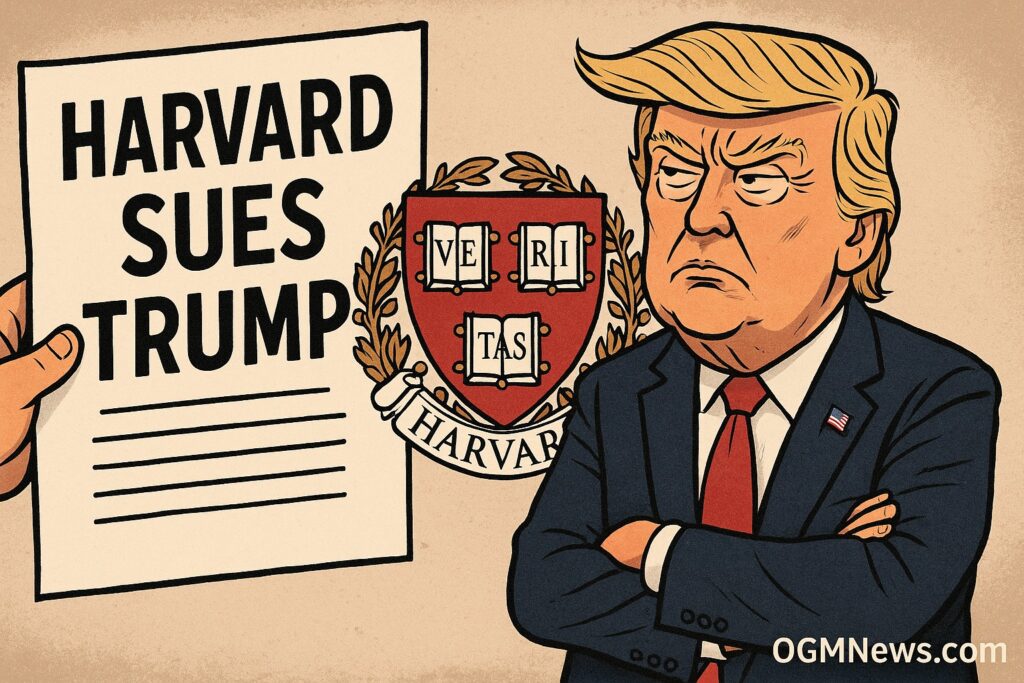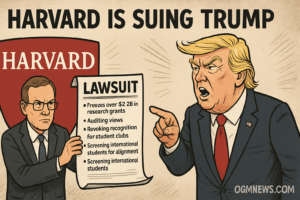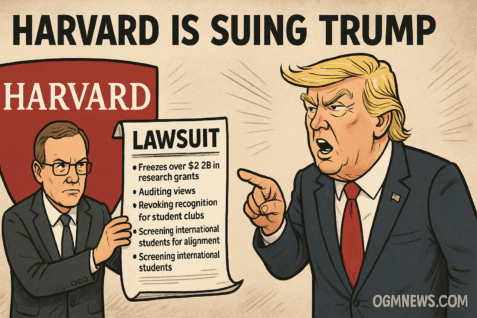Harvard University has launched a high-stakes legal battle against the Trump administration after a federal freeze was placed on over $2.2 billion in research grants. The decision to suspend funding comes as the administration seeks sweeping ideological and structural reforms from the nation’s oldest university — demands that Harvard officials argue are both unconstitutional and deeply damaging to academic freedom.
The lawsuit, filed in federal court on Monday, challenges what Harvard calls “an unprecedented overreach of executive power into the realm of higher education.” According to the complaint, the Trump administration conditioned the continuation of funding on Harvard’s compliance with a list of requirements, including changes to admissions policies and increased monitoring of student and faculty ideologies.
Demands That Sparked the Dispute
Among the administration’s demands were reforms to campus leadership and admissions processes, the revocation of recognition for certain student organizations, and a new disciplinary framework to crack down on protests. The university was also instructed to screen international students for their adherence to “American values.”
Critics argue that these requirements resemble ideological litmus tests, incompatible with democratic principles. Harvard officials view them as not only invasive but deeply antithetical to the mission of a modern research university. “This is not about compliance — this is about coercion,” said University President Alan Garber. “We cannot and will not subject our faculty, students, or international scholars to forced ideological conformity.”
Harvard University Sues Trump to Protect Academic Freedom

Central to Harvard’s legal argument is the First Amendment, which protects freedom of speech, thought, and association. The university contends that the administration’s demands violate these protections and are designed to chill dissenting viewpoints and suppress intellectual diversity under the guise of promoting it.
Legal scholars say the case could set a powerful precedent regarding the limits of federal influence over academic institutions. “This is one of the clearest examples in recent history of the government trying to dictate the ideological composition of a university,” said Professor Nadine Strossen, a former president of the ACLU. “It’s not only a threat to Harvard — it’s a threat to the entire ecosystem of American higher education.”
Bigger Stakes: More Funding at Risk, Tax Status Threatened
The $2.2 billion already frozen may be just the beginning. The Trump administration has launched a sweeping review of Harvard’s entire federal funding portfolio, totaling nearly $9 billion. Officials have suggested that an additional $1 billion in research grants could be withheld if the university continues to defy the demands.
Furthermore, Harvard’s tax-exempt status — a cornerstone of its financial model — is also under scrutiny. This marks a dramatic escalation in tactics that critics say are more about punishing dissent than ensuring fiscal or ethical accountability. “Weaponizing funding and tax status is not governance — it’s retaliation,” said Garber.
Harvard University: A National Flashpoint for University Autonomy
This legal battle represents a broader national conflict over the boundaries between government authority and institutional autonomy. Universities across the country are watching closely, as many rely heavily on federal research funding and face similar ideological pressures.
Faculty unions, student groups, and civil liberties organizations have rallied in support of Harvard, warning that a victory for the administration could open the floodgates to politically motivated interference in academia. “What’s at stake isn’t just Harvard’s future — it’s the independence of every American university,” said Rosa Ramirez, director of the National Council for Academic Freedom.
Political Reactions: Deepening Divides
Unsurprisingly, the lawsuit has drawn sharply divided reactions along partisan lines. Conservative lawmakers have applauded the administration’s push, framing it as an effort to “reclaim American values” on campuses they view as overly liberal. Senator Josh Hawley praised the freeze as “a necessary corrective to elite institutions that have lost their way.”
Meanwhile, Democratic leaders have condemned the move as authoritarian and vindictive. “This administration is using taxpayer dollars to impose a political agenda on institutions of learning,” said Senator Elizabeth Warren. “It’s a clear abuse of power.”
Harvard University: A Legal and Cultural Battle
The lawsuit is expected to progress rapidly, given the urgent financial implications for Harvard’s research programs. A preliminary injunction could be sought to unfreeze the $2.2 billion while the case proceeds. The university has also indicated that it may seek broader legal protections for academic institutions facing similar threats.
As the court battle unfolds, the case will likely become a symbol in the larger cultural war over the role of higher education in American society. With billions in funding and the future of academic independence on the line, Harvard’s legal challenge is poised to become a landmark moment in the history of American education.














